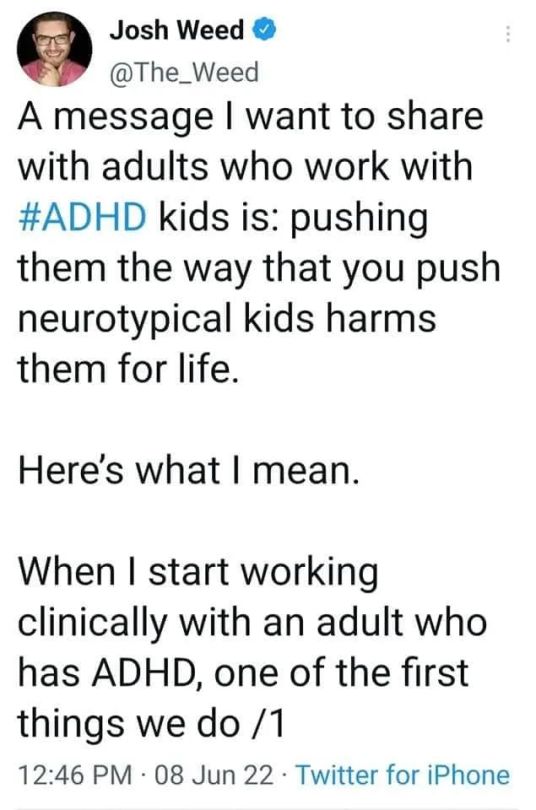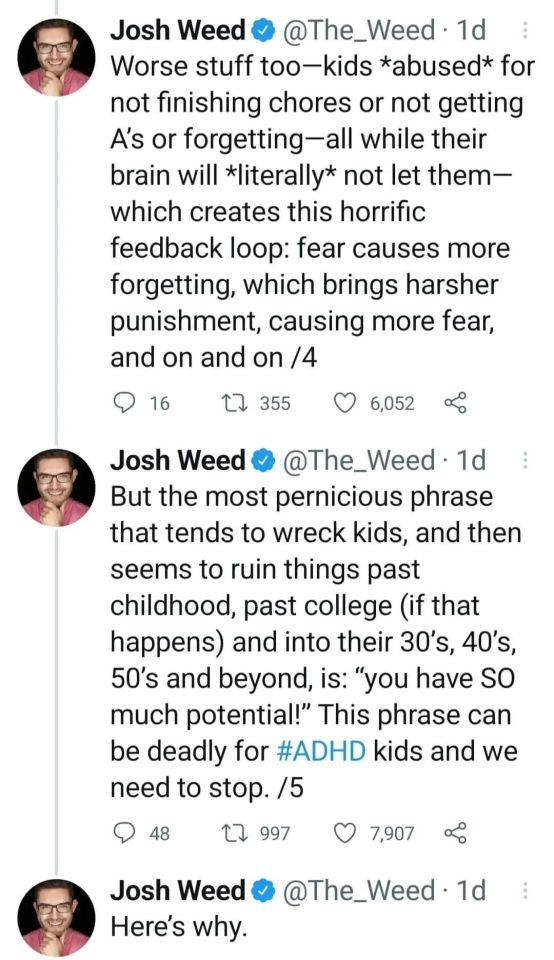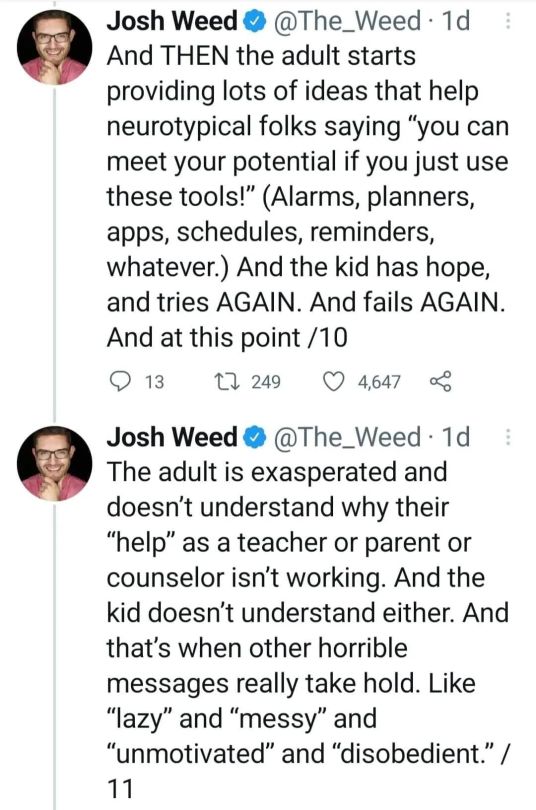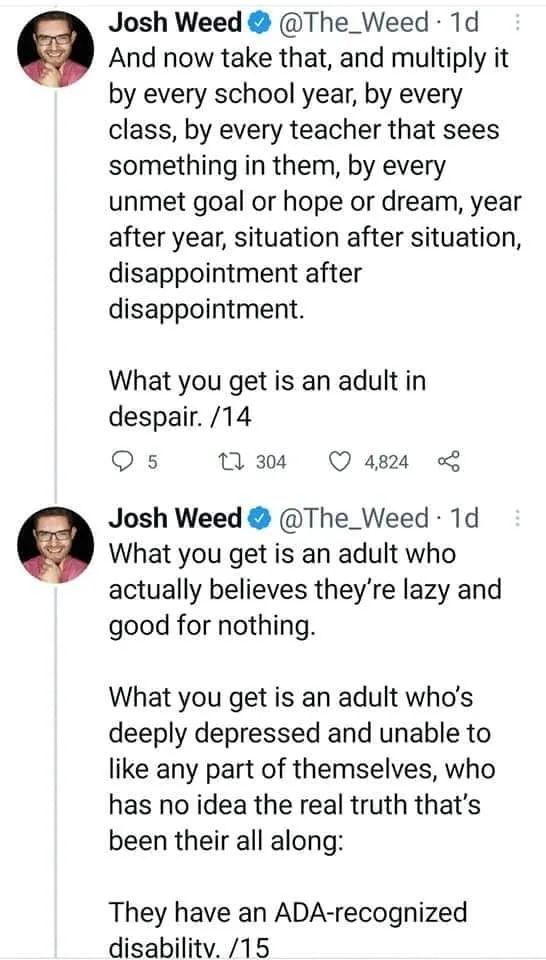The Worse Climate Disaster Gets, The More You’ll See Closet Eugenicists Start To Advocate For Letting
the worse climate disaster gets, the more you’ll see closet eugenicists start to advocate for letting people die. you need to be prepared to combat the ideology wherever you see it, because it’s only going to get worse and worse Read everything having to do with climate disaster critically. If the central argument underlying what’s being said is that the death of disabled and/or racialized people is inevitable, natural, or desirable– that’s a fascist.
they might be appear to be a garden variety republican or liberal or even a leftist at first, but know that if that argument is being made, their underlying ideology is one of supremacism, and given additional climate stress, they will become more blatant about it.
More Posts from Fishability and Others
A disabled woman fell on the bus I'm on and I'm literally the only one who listened to her and didn't try and pull her up when she said she wanted to sit for a second, or crowd her saying what she should do next.
Can we actually listen to disabled people maybe? This is exhausting.
I think the reason a lot of leftists struggle with disability justice is that they haven't moved past the concept that discrimination isn't bad because it's objectively "wrong." yes, sexists are objectively wrong when they try to claim women are dumber than men. yes, antisemites are objectively wrong that jewish people are inherently greedy and run the state. yes, racists are wrong when they try to claim that white people are the superior race. and so on.
but then with disabled people, there are a lot of objective truths to the discrimination we face. people with IDs/LDs do fall behind and struggle with certain concepts. physically disabled people are often weaker and less capable of performing demanding tasks than able bodied people. many of us with mental illnesses are more reckless and less responsible. a lot of us are dependent on others and do not contribute much "worth".
and guess what? disabled people still deserve a place in the world. disabled people still deserve the supports they need. because they are people, and that should be enough to support them and believe they deserve a place at the table.
if your only rebuttal against discrimination is its objective inaccuracies, you are meeting bigots where they are at. you are validating the very concept that if and when people are truly incapable of being equal to the majority, that means they are worth less. this causes some leftists to then try to deny the objective realities of disabled people and/or become ableist themselves.
your rallying behind marginalized groups should start and end with the fact that people are completely worthy of life and equity, because they are fellow human beings and that should, frankly, be enough.
post by @ lucyedwardsofficial on instagram showing how the paralympics includes blind/visually impaired viewers of goalball!
My husband and I became catechumens in the EOC for which we are incredibly grateful. Here’s my dilemma though.
I can’t attend Divine Liturgy because of my chronic illness. The priest is very understanding of this and is genuinely trying to accommodate us the best anyone can.
He wants us to get plugged into the community despite my limitations and is thinking of safe ways for us to do so, since I am immunocompromised and my husband (who has lupus) is also facing potential new health concerns. Though we want community as well, I am having debilitating anxiety around it.
My illness is so unpredictable. I have good days and bad days. Some days, I need my wheelchair or another mobility aid (which I don’t like using because I don’t like being vulnerable but I NEED to use them for safety and/or energy preservation). But other days, I do not need anything. Chronic illness has SO MANY facets and triggers and layers of unpredictability! In the past, many people (mostly people from our old church) have accused me of faking my disability when they’ve seen me on a good day, or when they’ve seen me without a mobility aid after needing one a previous day. They’ve told me I’m making excuses, that I’m faking for attention, etc.
No one but my husband ever sees the “details” of my chronic illness, after all. They don’t see me when I’m curled up all night on the bathroom floor bc of gastroparesis agonizing and crying for it all to end, or being SO extremely fatigued due to POTS that I can’t move a limb out of bed. They didn’t see me when I fell that morning which warranted me using my rollator for the rest of the day to prevent another concussion. They don’t see the painful internal struggle of trying to walk in the summer heat without support. Anyone with a chronic illness can relate!
People from my last church (not an OC) said hurtful things and more and told me I’m going to hell for a number of reasons- because I don’t have kids, because I don’t go to church on Sundays etc. i had poured my soul into that parish. Then, everyone left. We felt abandoned.
This served as the catalyst to question our faith -tradition, theology, and everything- and ultimately, everything came together to lead us to Orthodoxy which is a HUGE blessing! But I’m just SO EMOTIONAL because though I’m more than ready to embrace the fullness of faith and the Sacraments when the time comes, I don’t think I can ever be a part of a community.
It’s exhausting to have to try to explain the ins- and- outs of my illness to new people, many of whom wouldn’t even believe me. And I just don’t want to get hurt again. I know it’s wrong of me to assume that every new person I meet will eventually judge me and leave, but that’s just what we’ve consistently experienced. That’s all we know. I have a small circle of friends, and I’ve known all of them for many years - those friendships have stood the test of time and I’m grateful for them.
I honestly don’t know why I’m making this dumb post. I’m not trying to throw myself a pity party, I just need a place to vent and let it all out. I’m also just in a totally bad headspace right now and my anxiety levels overall are insanely high with my husband preparing for a high stakes surgery in a few days and me having side effects from the rescue medication I had to take last night. But if you’re reading this and have any advice, please tell me. And please pray for us. Please pray for peace and healing in our lives, spiritually, physically, and emotionally. Please pray that i can stop myself from spiraling into depression - I can feel it happening. I feel like a burden to my husband and the few friends I have and the devil is probably angry that I made the decision to become a catechumen. Please pray that we can find joy this Pascha, even though we are separated from the Church, knowing that we rejoice in Jesus’s resurrection. The pain runs deep but His love runs deeper.
Thank you. 🤍
every time anyone talks about liberation for the intellectually disabled in any real material way (i.e. creating plain-language educational resources accessible to adults reading on a first-grade level, detangling literacy from basic requirements to participate in society, destigmatizing inability to benefit from pedagogy, criticizing the construct of financial literacy as a necessary skill, etc etc etc), some chud comes along calling it "anti-intellectualism" and blabbing about how you're a morally inferior person if you only read middle-grade novels for fun, i'm so tired and we are never making it out
I found an extremely dope disability survival guide for those who are homebound, bedbound, in need of disability accommodations, or would otherwise like resources for how to manage your life as a disabled person. (Link is safe)

It has some great articles and resources and while written by people with ME/CFS, it keeps all disabilities in mind. A lot of it is specific to the USA but even if you're from somewhere else, there are many guides that can still help you. Some really good ones are:
How to live a great disabled life- A guide full of resources to make your life easier and probably the best place to start (including links to some of the below resources). Everything from applying for good quality affordable housing to getting free transportation, affordable medication, how to get enough food stamps, how to get a free phone that doesn't suck, how to find housemates and caregivers, how to be homebound, support groups and Facebook pages (including for specific illnesses), how to help with social change from home, and so many more.
Turning a "no" into a "yes"- A guide on what to say when denied for disability aid/accommodations of many types, particularly over the phone. "Never take no for an answer over the phone. If you have not been turned down in writing, you have not been turned down. Period."
How to be poor in America- A very expansive and helpful guide including things from a directory to find your nearest food bank to resources for getting free home modifications, how to get cheap or free eye and dental care, extremely cheap internet, and financial assistance with vet bills
How to be homebound- This is pretty helpful even if you're not homebound. It includes guides on how to save spoons, getting free and low cost transportation, disability resources in your area, home meals, how to have fun/keep busy while in bed, and a severe bedbound activity master list which includes a link to an audio version of the list on Soundcloud
Master List of Disability Accommodation Letters For Housing- Guides on how to request accommodations and housing as well as your rights, laws, and prewritten sample letters to help you get whatever you need. Includes information on how to request additional bedrooms, stop evictions, request meetings via phone, mail, and email if you can't in person, what you can do if a request is denied, and many other helpful guides
Special Laws to Help Domestic Violence Survivors (Vouchers & Low Income Housing)- Protections, laws, and housing rights for survivors of DV (any gender), and how to get support and protection under the VAWA laws to help you and/or loved ones receive housing and assistance
Dealing With Debt & Disability- Information to assist with debt including student loans, medical debt, how to deal with debt collectors as well as an article with a step by step guide that helped the author cut her overwhelming medical bills by 80%!
There are so many more articles, guides, and tools here that have helped a lot of people. And there are a lot of rights, resources, and protections that people don't know they have and guides that can help you manage your life as a disabled person regardless of income, energy levels, and other factors.
Please boost!
Things to research before getting your first custom manual wheelchair
one of the biggest things I can recommend to anyone getting a new custom chair (but especially a first custom chair) is to understand all of the parts of a wheelchair and what they do. I decided to make a guide with wheelchair parts to research and places to look for information to make this process a little bit easier. additional link suggestions are welcome.
General resources:
Permobil - The Wheelchair Handbook
Motion Composites - Preparing for Your Wheelchair Evaluation: Before the Evaluation (Part 1)
Motion Composites - Preparing for Your Wheelchair Evaluation (Part 2)
1. Frame
Motion Composites - Folding vs Rigid Wheelchair Frames: How to Choose
Permobil - Manual wheelchairs: rigid and folding frames. How do you choose?
GTK - Oh what’s in a frame? Comparing Multiple Materials
Motion Composites - Wheelchairs: Carbon Fiber Versus Aluminum
2. Front frame angle
Motion Composites - Understanding the Impact of Rigid Wheelchair Front Frame Angle
Sunrise Medical - Rigid Frame Wheelchairs – Frame Angle and Inset
4. Seat dump
Permobil - Ergonomic Seating and Manual Wheelchairs
Spinlife - Wheelchair Back & Seat Angle
5. Caster size, style, and position
Motion Composites - Front Casters for Manual Wheelchairs Practical Guide
Sunrise Medical - Front Caster Position in Manual Wheelchairs
6. Caster forks
New Mobility - Caster Wheels and Forks
Sunrise Medical - Maneuverability in Manual Wheelchairs - What Fork to use?
New Mobility - Innovations: Emerging Trends in the Wheelchair Market (information about single sided forks)
7. Footplate
Motion Composites - Footrest Options to Support Function and Mobility
When Tania Talks - Active User Wheelchair Footplate Options
8. Calf strap
Spex Seating - Lower Leg Support Considerations in Wheelchair Seating
9. Seat pan
Permobil - Solid Seat Insert for Wheelchair: Taking a Closer Look at Cushion Components
10. Seat cushion
Permobil - What to Look for in Seating & Positioning Products
Permobil - How to Choose a Cushion in Long Term Care
Permobil - Cushion Geometry: Linear and Contoured
Freedom Mobility Center - Wheelchair Seat Cushions: 5 Tips for Choosing the Right One for You
Mobility Basics - Seat Cushion Rigidizer
Motion Composites - Selecting the Right Cushion for Your Wheelchair a Clinicians Guide
Motion Composites - Covering the Basics of Wheelchair and Back Support Covers
11. Seat belts
12. Clothing guards
Sherman Oaks Medical Equipment - Wheelchair Clothes Guards / Side Guards Guide
13. Arm rests
United Spinal Association - Wheelchair Armrests What Do They Really Do?
Spinlife - Wheelchair Arm Rest Choices
Motion Composites - Armrests: Getting the Support you Need
14. Back supports
Motion Composites - Solid vs Upholstery Backs
Mobility Management - How to Choose the Right Back Height for your Client
Freedom Mobility Center - Why a Solid Back is Preferred Over a Sling Back
Mobility Basics - Back Supports
Sunrise Medical - Tips for Selecting Prefabricated Wheelchair Backs
Motion Composites - Covering the Basics of Wheelchair and Back Support Covers
15. Head supports
16. Push handles
Motion Composites - Push Handles: Pushing Around
17. Wheels
Motion Composites - Rolling Along: The Importance of Rear Wheel Selection
Sunrise Medical - Comparing Wheelchair Wheel Spoke Options
Mobility Basics - Manual Wheelchair Wheels
18. Tires
New Mobility - Everything You Need to Know About Selecting the Right Wheelchair Tires
GTK - Solid versus Pneumatic Tyres
Mobility Basics - Manual Wheelchair Wheels
Motion Composites - Tire Selection: Balancing Performance and Maintenance
19. Brakes
Motion Composites - Wheel Locks: Unlocking Safety and Function
20. Push rims/Hand rims
Motion Composites - Getting a Grasp: Understanding the Impact of Hand Rims
DME Hub - Wheelchair Hand Rom Options and Factors to Consider
21. Anti-tip wheels
22. Camber
Motion Composites - Camber - Degrees of Performance
23. Center of Gravity
Motion Composites - Rear Wheel Position 101
-
 morasyframbuesas liked this · 1 month ago
morasyframbuesas liked this · 1 month ago -
 grievingangelhopefuldemon reblogged this · 1 month ago
grievingangelhopefuldemon reblogged this · 1 month ago -
 grievingangelhopefuldemon reblogged this · 1 month ago
grievingangelhopefuldemon reblogged this · 1 month ago -
 grievingangelhopefuldemon reblogged this · 2 months ago
grievingangelhopefuldemon reblogged this · 2 months ago -
 cannedclown reblogged this · 2 months ago
cannedclown reblogged this · 2 months ago -
 cannedclown liked this · 2 months ago
cannedclown liked this · 2 months ago -
 thevagabondexpress reblogged this · 2 months ago
thevagabondexpress reblogged this · 2 months ago -
 acidreflexing reblogged this · 2 months ago
acidreflexing reblogged this · 2 months ago -
 acidreflexing liked this · 2 months ago
acidreflexing liked this · 2 months ago -
 galactic-bi-cat liked this · 2 months ago
galactic-bi-cat liked this · 2 months ago -
 ann-beth reblogged this · 2 months ago
ann-beth reblogged this · 2 months ago -
 grievingangelhopefuldemon reblogged this · 2 months ago
grievingangelhopefuldemon reblogged this · 2 months ago -
 parkerfinn liked this · 2 months ago
parkerfinn liked this · 2 months ago -
 grievingangelhopefuldemon reblogged this · 2 months ago
grievingangelhopefuldemon reblogged this · 2 months ago -
 pixellangel liked this · 2 months ago
pixellangel liked this · 2 months ago -
 uhuh100 reblogged this · 2 months ago
uhuh100 reblogged this · 2 months ago -
 uhuh100 liked this · 2 months ago
uhuh100 liked this · 2 months ago -
 grievingangelhopefuldemon reblogged this · 2 months ago
grievingangelhopefuldemon reblogged this · 2 months ago -
 grievingangelhopefuldemon reblogged this · 2 months ago
grievingangelhopefuldemon reblogged this · 2 months ago -
 grievingangelhopefuldemon reblogged this · 2 months ago
grievingangelhopefuldemon reblogged this · 2 months ago -
 i-am-amy-amy-is-me reblogged this · 2 months ago
i-am-amy-amy-is-me reblogged this · 2 months ago -
 secondbreakfastwizard reblogged this · 2 months ago
secondbreakfastwizard reblogged this · 2 months ago -
 catcomicspro liked this · 2 months ago
catcomicspro liked this · 2 months ago -
 crowned-chaos reblogged this · 2 months ago
crowned-chaos reblogged this · 2 months ago -
 crowned-chaos liked this · 2 months ago
crowned-chaos liked this · 2 months ago -
 grievingangelhopefuldemon reblogged this · 2 months ago
grievingangelhopefuldemon reblogged this · 2 months ago -
 sparker1902 liked this · 2 months ago
sparker1902 liked this · 2 months ago -
 mariannetheflash liked this · 2 months ago
mariannetheflash liked this · 2 months ago -
 noweriii liked this · 2 months ago
noweriii liked this · 2 months ago -
 s-h-a-s-e reblogged this · 2 months ago
s-h-a-s-e reblogged this · 2 months ago -
 s-h-a-s-e liked this · 2 months ago
s-h-a-s-e liked this · 2 months ago -
 ginkgo-a-go-go reblogged this · 2 months ago
ginkgo-a-go-go reblogged this · 2 months ago -
 miss-drawma-queen liked this · 2 months ago
miss-drawma-queen liked this · 2 months ago -
 doctorxtardisotp reblogged this · 2 months ago
doctorxtardisotp reblogged this · 2 months ago -
 grievingangelhopefuldemon reblogged this · 2 months ago
grievingangelhopefuldemon reblogged this · 2 months ago -
 foulpaperbonkparty reblogged this · 2 months ago
foulpaperbonkparty reblogged this · 2 months ago -
 foulpaperbonkparty liked this · 2 months ago
foulpaperbonkparty liked this · 2 months ago -
 moth-lover-not-mother reblogged this · 2 months ago
moth-lover-not-mother reblogged this · 2 months ago -
 moth-lover-not-mother liked this · 2 months ago
moth-lover-not-mother liked this · 2 months ago -
 urdandelionbud reblogged this · 2 months ago
urdandelionbud reblogged this · 2 months ago -
 magic-foxes liked this · 2 months ago
magic-foxes liked this · 2 months ago -
 planetpluuto reblogged this · 2 months ago
planetpluuto reblogged this · 2 months ago -
 backupmakeshiftlifeinwaiting reblogged this · 2 months ago
backupmakeshiftlifeinwaiting reblogged this · 2 months ago -
 backupmakeshiftlifeinwaiting liked this · 2 months ago
backupmakeshiftlifeinwaiting liked this · 2 months ago -
 frostythespacecat reblogged this · 2 months ago
frostythespacecat reblogged this · 2 months ago -
 lightoftheseraph liked this · 2 months ago
lightoftheseraph liked this · 2 months ago -
 grapeflavoredclown reblogged this · 2 months ago
grapeflavoredclown reblogged this · 2 months ago -
 grapeflavoredclown liked this · 2 months ago
grapeflavoredclown liked this · 2 months ago -
 blurringmysoul liked this · 2 months ago
blurringmysoul liked this · 2 months ago -
 aph-prussias-milkshake liked this · 2 months ago
aph-prussias-milkshake liked this · 2 months ago

74 posts

![therapist: what do you do when someone doubts the validity of your chronic illness?
Me: ask them about their chronic stupidity?
therapist: No.
Me: set them on fire?
therapist: No...
Me: cut them?
Therapist:... [face palm emoji]](https://64.media.tumblr.com/da0f2b2db075f05ac2528d0e1e6a51bc/0eadfcf3096cc4e7-4b/s500x750/a67d4614308af387ccc77b56e2adc0e7c1ed6aca.jpg)







